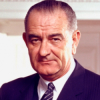Lyndon B. Johnson

Lyndon B. Johnson
Lyndon Baines Johnson, often referred to as LBJ, was the 36th President of the United States from 1963 to 1969, assuming the office after serving as the 37th Vice President of the United States under President John F. Kennedy, from 1961 to 1963. Johnson was a Democrat from Texas, who served as a United States Representative from 1937 to 1949 and as a United States Senator from 1949 to 1961. He spent six years as Senate Majority Leader, two as...
NationalityAmerican
ProfessionUS President
Date of Birth27 August 1908
CountryUnited States of America
The purposeful many need not and will not bow to the willful few.
We cannot have government for all the people until we first make certain it is government of and by all the people.
[E]very man, everywhere, should be free to develop his talents to their full potential - unhampered by arbitrary barriers of race or birth or income.
It is a truism that education is no longer a luxury. Education in this day and age is a necessity.
Life is never easy. There is work to be done and obligations to be met - obligations to truth, to justice, and to liberty.
...where legitimate opportunities are closed, illegitimate opportunities are seized. Whatever opens opportunity and hope will help to prevent crime and foster responsibility.
Of all the problems of conservation, none is more urgent that the polluted air which endangers the American people. We have been fortunate so far. But we have seen that when winds fail to blow, the concentrations of poisonous clouds over our cities can become perilous.
The debris of civilization litters the landscapes and spoils the beaches. Conservation's concerns now is not only for man's enjoyment-but for man's survival.
An unfolding technology has increased our economic strength and added to the convenience of our lives. But that same technology-we know now-carries danger with it. From the great smoke stacks of industry and from the exhausts of motors and machines, 130 million tons of soot, carbon and grime settle over the people and shroud the Nation's cities each year. From towns, factories, and stockyards, wastes pollute our rivers and streams, endangering the waters we drink and use.
The time has come when we cannot be so careless. Unless we do better, we may suffer through a stark emergency of the environment. We may create a hostile world: a world to bruise ourselves against; a world of sprawling cities, unplanned or badly planned; a world whose water is full of sludge, whose winds are full of soot; a world whose landscape has been totally neglected, stripped, marred, and wasted. All of this need not happen if we choose well, and particularly if we plan well and if we act well.
We do not want an expanding struggle with consequences, that no one can perceive, nor will we bluster or bully or flaunt our power, but we will not surrender and we will not retreat, for behind our American pledge lies the determination and resources, I believe, of all of the American nation.
Peace does not come just because we wish for it. Peace must be fought for. It must be built stone by stone.
The American West is just arriving at the threshold of its greatness and growth. Where the West of yesterday is glamorized in our fiction, the future of the American West now is both fabulous and factual.
Democracy is a constant tension between truth and half-truth and, in the arsenal of truth, there is no greater weapon than fact.